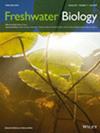长期船只噪音对非洲慈鲷马兰迪亚斑马早期生长和行为模式的影响
IF 2.7
2区 生物学
Q2 ECOLOGY
引用次数: 0
摘要
目前,水下人为噪声被认为是一种全球性的环境污染物,对多种水生动物的行为和生理产生负面影响。然而,缺乏关于长期暴露于人为噪声对鱼类影响的长期研究,特别是在生命早期阶段。在这里,我们专注于一种著名的鱼类行为模型——马兰迪亚斑马慈鲷,以评估船只噪音对其12周以上生命早期阶段的影响。为了最大限度地减少潜在的遗传影响,研究人员采用了一种分开育雏的方法,每只雌性后代中有一半暴露于对照处理(100 dB re. 1 μPa),而另一半则接受船舶噪声处理(120 dB re. 1 μPa)。随后,我们每周密切监测它们的生长和行为变化,包括觅食、领土行为、游泳和群体凝聚力。我们发现,与对照组相比,暴露于船只噪音的幼鱼表现出更大的觅食活动和游泳距离,更靠近水面,挖掘行为、庇护所使用和群体凝聚力减少。然而,在实验结束时,实验组和对照组的鱼在任何测量变量上都没有差异,这表明它们对噪音已经习惯了。我们的研究结果表明,长期的船只噪音会影响发育过程中的一系列行为,这些行为似乎会随着保持能量平衡的需要而改变,这与短期噪音暴露下观察到的情况不同。这些变化可能会在野外造成不可预测的风险,尤其是在习惯发生之前。本文章由计算机程序翻译,如有差异,请以英文原文为准。
Long-Term Boat Noise Effects on Growth and Behavioural Patterns During Early Life Stages of the African Cichlid Maylandia zebra
- Underwater anthropogenic noise is currently recognised as a global environmental pollutant, with negative impacts on the behaviour and physiology of a wide range of aquatic animals. However, long-term studies on the effects of chronic exposure to anthropogenic noise on fish are lacking, especially regarding early life stages.
- Here, we focused on a well-known fish behavioural model, the cichlid fish Maylandia zebra, to assess the effects of boat noise on early life stages over 12 weeks. To minimise potential genetic effects, a split-brood approach was employed, with half of each female's offspring exposed to control treatment (100 dB re. 1 μPa), while the other half was subjected to boat noise treatment (120 dB re. 1 μPa). Subsequently, we closely monitored weekly changes in growth and behaviour, including foraging, territorial behaviour, swimming, and group cohesion.
- We found that juveniles exposed to boat noise exhibited increased foraging activity and swimming distance, stayed closer to the water surface, and showed reduced digging behaviour, shelter use, and group cohesion compared to control juveniles. However, at the end of the experiment, there were no differences between treatment and control fish in any measured variable, suggesting habituation to noise.
- Our findings suggest that long-term boat noise affects a suite of behaviours during development that appear to change in concert—likely by the need to maintain an energy balance—and differ from those observed under short-term noise exposure. These changes could pose unpredictable risks in the wild, especially before habituation occurs.
求助全文
通过发布文献求助,成功后即可免费获取论文全文。
去求助
来源期刊

Freshwater Biology
生物-海洋与淡水生物学
CiteScore
5.90
自引率
3.70%
发文量
162
审稿时长
2 months
期刊介绍:
Freshwater Biology publishes papers on all aspects of the ecology of inland waters, including rivers and lakes, ground waters, flood plains and other freshwater wetlands. We include studies of micro-organisms, algae, macrophytes, invertebrates, fish and other vertebrates, as well as those concerning whole systems and related physical and chemical aspects of the environment, provided that they have clear biological relevance.
Studies may focus at any level in the ecological hierarchy from physiological ecology and animal behaviour, through population dynamics and evolutionary genetics, to community interactions, biogeography and ecosystem functioning. They may also be at any scale: from microhabitat to landscape, and continental to global. Preference is given to research, whether meta-analytical, experimental, theoretical or descriptive, highlighting causal (ecological) mechanisms from which clearly stated hypotheses are derived. Manuscripts with an experimental or conceptual flavour are particularly welcome, as are those or which integrate laboratory and field work, and studies from less well researched areas of the world. Priority is given to submissions that are likely to interest a wide range of readers.
We encourage submission of papers well grounded in ecological theory that deal with issues related to the conservation and management of inland waters. Papers interpreting fundamental research in a way that makes clear its applied, strategic or socio-economic relevance are also welcome.
Review articles (FRESHWATER BIOLOGY REVIEWS) and discussion papers (OPINION) are also invited: these enable authors to publish high-quality material outside the constraints of standard research papers.
 求助内容:
求助内容: 应助结果提醒方式:
应助结果提醒方式:


